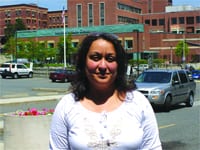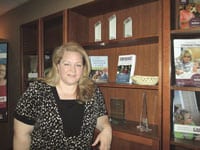Ending the Stigma Amigas de Pecho Gives Women with Breast Cancer Invaluable Support
In the four years since launching Amigos de Pecho, Vilmarie Villanueva has helped bring about a culture change in Holyoke — and save lives in the process.
Begun in 2006 with a grant from the Susan G. Komen Foundation, and now funded totally by Holyoke Medical Center, the program — which translates in English to Bosom Buddies — conducts outreach into the Latina population and offers support services for women with breast cancer.
“It’s mainly for the Latina community, but it does service anyone who needs it,” said Villanueva, case worker for the Women’s Center at HMC. “I keep it in a bilingual format so everyone is comfortable I don’t care who they are; if they need me, I’m there.
“The program has a lot of different mini-programs or sections, but in the big picture, it’s a support group for women with breast cancer,” she continued, adding that the group is the only one of its kind in Holyoke, Spanish or English. “The hospital does have its own cancer support program, but it doesn’t serve women specifically with breast cancer, which is a whole other spectrum; they need their own services.”
Spanish-language breast cancer support groups are nothing new; across the nation, African-Americans, Asian-Americans, lesbians, and others have also formed their own groups to create a feeling of comfort and inclusion. But, while women in support groups tend to have a better breast-cancer survival rate, research has shown that Hispanics are more likely to seek support from their families only — and are more apt to neglect regular mammograms and other health screenings.
That’s where the other major component of Amigas de Pecho comes in. Villanueva and her staff also encourage women in the community to get screened for breast cancer, and they follow up with those who fail to keep their medical appointments.
“It’s not as widespread a problem as it used to be, and it’s getting better,” Villanueva told The Healthcare News. “But there are still women fearful of facing a mammogram, and for some in the Latino community, there is a stigma or taboo about allowing women to touch your body. They feel that it’s weird, and something they don’t want to experience. I’ve heard of many women who say, ‘I’m not going to show my breasts to a stranger.’ I’ve heard of women who have never gone to the gynecologist, or any other doctor, and when they do end up coming, sometimes it’s too late.
“That’s a shame,” she said. “I hear these stories all the time. I was surprised at first when I started doing this work, hearing women saying these things, and I just said, ‘this is unacceptable. This has to change.’ I’m glad to see it has changed somewhat, but there’s still a lot of work to do.”
Easing the Fear
The support group typically includes about 20 women, both breast-cancer survivors and those currently battling the disease, who meet weekly to talk about whatever’s on their minds. Villanueva also conducts a partnering program, teaming a woman who has tested positive for breast cancer with one who has survived the disease.
Group activities are planned for each meeting; sometimes the group does yoga, Reiki, massage, or arts and crafts, but the most important element is the communication and shared experiences intended to strengthen and enrich each woman.
“They’re all united by breast cancer, from 20-year survivors to brand-new, recently diagnosed women,” she said, noting that they range in age from their 30s to upper 60s.
“The other side of my program is follow-up services from the hospital, meaning I do follow-ups on women who have been late with their appointments, for whatever reason,” she explained. “It may be that some women don’t come because of fear of the unknown; they don’t know what to expect when they come here for their mammogram. They’ve heard horror stories about mammograms, so they’re afraid to come. But now, especially with the new, digital mammography, they’re so relieved when they come, and they’re in and out in 10 minutes, and it doesn’t even hurt. So just getting the word out about that is very important.”
About 190,000 new breast cancer cases are reported each year in the U.S., while more than 40,000 women die annually from the disease. The five-year mortality rates for Caucasian and Hispanic women are almost identical when detected at similar points in the disease progression.
However, while Hispanic women are diagnosed with breast cancer 40{06cf2b9696b159f874511d23dbc893eb1ac83014175ed30550cfff22781411e5} less frequently than women of non-Hispanic origin, according to the American Cancer Society, they are often diagnosed at later stages, making treatment more difficult and lowering survival rates — partly because Hispanic women are less likely to take advantage of screening.
Latinas are less likely to follow through with screenings for a variety of cultural reasons, Villanueva said, including a stigma about breast cancer and that aforementioned fear of mammograms or anxiety about showing their bodies in the doctor’s office.
So Amigas de Pecho tries to break that stigma and fear by getting the word out about why mammograms are important and why breast-cancer patients might benefit from a support network. Villanueva uses educational shows on the radio, print and broadcast advertisements, and a strong presence at festivals, health fairs, and other community events. “Anytime there’s something going on in the community, we’re there to be seen and heard,” she said. “Women hear about it, and they schedule their appointments because they’ve received this information.”
First Steps
Villanueva is gratified to know that women have taken that first step because of Amigas de Pecha, and in some cases wound up with a breast cancer diagnosis that would have been much more advanced had they waited.
“If it weren’t for the work we’ve been trying to do, it could have turned into a disastrous thing for a lot of them and cost their lives,” she said.
As for those who have already been diagnosed, “for some of them, we’re the only support they have to take them through the difficulties of cancer treatment,” Villanueva said. “Women have said, ‘if not for this group, I would not have gotten through it.’”
Villanueva isn’t shy about meeting women on their own terms. If they feel anxious about visiting the hospital or leaving their house to attend a support meeting, she’ll do home visits to educate women and teach them how to do breast self-exams, or encourage those with a breast-cancer diagnosis to follow through with scheduled treatment. She’s even scheduled group meetings in homes when a cancer patient is too nervous to venture out to a different location. Some refuse the invitation altogether, taking a while to warm up to the idea of participating in a support group.
“Then we hope that, in time, that anxiety subsides, and they will join us, which is what we’ve been seeing,” she said.
“A lot of women are embarrassed about having breast cancer,” she added. “Or they’re embarrassed that their breasts have been deformed or cut off. But as a group, they’re able to talk about that intense feeling of embarrassment and shame, and they feel better as they realize they aren’t the only one, and what the possibilities are after breast cancer.”
Villanueva believes her job with Amigas de Pecho will become easier in years to come, because much of the anxiety and stigma surrounding breast cancer is prevalent in older generations.
“The younger generations have better knowledge about this disease and the need to take action,” she said. “I think they’ll make an impact in the future.”
In the meantime, she and her team continue to make an impact in Holyoke right now — one anxious woman at a time.




Comments are closed.